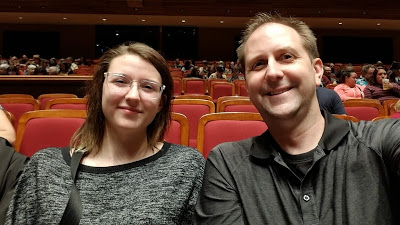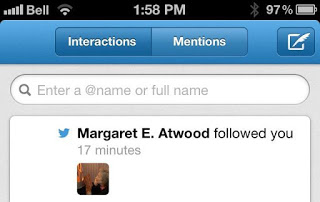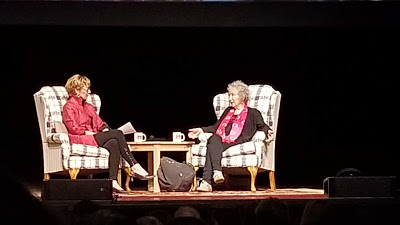I’m going to be 100% honest here and say that I’ve tried to read a number of her novels and have had a hard time with them. She’s one hell of a writer, to be sure, but something about the books I picked up didn’t resonate with me. Then, there’s the Handmaid’s Tale. That one positively shook me (seriously, you have to read that book). I am also a huge fan of all the editorials and articles she’s written over the years, as well as her comic.
As a Canadian, a writer, an unabashed liberal, and an aspiring feminist, I could not pass up the opportunity to hear Ms. Atwood speak. I asked my 16-year-old daughter, who is also all those things (except she’s an actual feminist and helping me on my journey toward being one as well) if she wanted to go with me and her response in the affirmative came in the snap of a finger. The stage was set.
 |
| Waiting for Atwood. |
How much was I looking forward to this? Time for a little backstory:
In 2012 I followed a boatload of accounts on Twitter. Of them, well over a hundred were writers. One day I noticed that only three of them didn’t follow me back: Amber Naslund, Neil Gaiman, and Margaret Atwood. In an effort to coerce the three non-following amigos to follow me on Twitter I sent out this tweet:
Of all the people I follow and list as “writers” only @AmberCadabra @neilhimself & @MargaretAtwood don’t follow me. Huh.— Andrew Butters, Writer of #Books (@andrewbutters) September 8, 2012
https://platform.twitter.com/widgets.js
And wouldn’t you know it, within minutes this notification popped up on my phone:
 |
| “I am suddenly very aware of all the words I plan to use on Twitter.” |
Suffice it to say, I lost my mind. The fact that she hasn’t unfollowed me since then is somewhat of a miracle.
So, how did it go?
I’m actually having a hard time describing it because it was just that fantastic. Atwood’s sense of humour is razor sharp. The interviewer kept having to bring her back to the topic because she would run off on these wonderfully humourous tangents. Another thing that became apparent rather quickly, and it should be pointed out that this should be obvious to anyone who’s ever even heard of her, is that Margaret Atwood is one hell of a storyteller. Wow. I mean, just wow. It was absolutely amazing.
She’s also one of the most quotable people I’ve ever had the pleasure of hearing speak. I was going to write them all down so I could tweet them or post them as captions on photos for Instagram, but there were too many.
 |
| Diaene Vernile (left) talks with Margaret Atwood |
She talked about growing up in Quebec without any of the big city conveniences that were starting to take hold. There was a lot of talk about how she became a writer and her influences. Talk eventually turned to the Handmaid’s Tale and what was going on around her when she wrote it. Here’s an interesting bit of information. Everything that happened in that book has actually happened at some time or place in human history. Everything. And if that’s not enough to rock you to your core I don’t know what is.
The thing about the whole evening was I learned as much about Margaret Atwood, the Canadian literary hero, as I did about myself, the struggling-to-make-it part-time writer, husband, and father of two.
I wish I could have recorded the entire session because I certainly would have been going back to it time after time to pick out those truly wonderful nuggets of inspiration or those key lessons about writing, which she didn’t hit you over the head with but rather sprinkled in here and there so only those paying attention noticed them. As it was, there were two takeaways that I am prepared to share:
- She wrote her first book when she was 7. It was about an ant, and in her words (mostly, I think I remembered them correctly), “Nothing happened until the fourth quarter! As an egg, an ant does nothing. As a larva, an ant does nothing but eat and sleep. As a pupa, an ant does nothing. The only reason to keep turning pages was to find out if anything ever happens. I tell people, if you’re writing a murder mystery, move up the corpse! People need to know about the dead body, or if there even is one, sooner than later.”
- Work with what you’ve got and never give up. She grew up without electricity in the middle of a remote area of Quebec. There were books though, so she read them. There were pencils and paper, so she wrote. Her first novel, still to this day unpublished, was handwritten (because at that time she didn’t know how to type) on blank exam booklets from the university where she was studying. “It just happened to work out that every chapter was exactly as long as one of those booklets.”
So, there you have it. A taste of what I experienced Thursday night. To share that moment with my daughter was indescribable and I will cherish the memory of it for the rest of my life. What it’s also done is strengthened my resolve with respect to learning my craft. I have a story idea for something Margaret Atwood-ish. It’s more a cross between 1984, Farenheight 451, The Handmaid’s Tale, and Asimov’s essay The Last Question, but the point is I am not ready to write it yet. I need to learn more, work harder, and make a metric tonne more mistakes before I can tackle it.
So I will.
~ Andrew